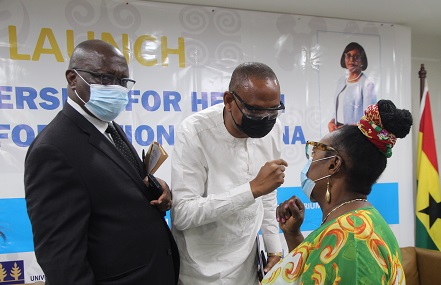
MoH, WHO drive national health reforms
The Ministry of Health, in partnership with the World Health Organisation, has launched a capacity building programme to develop the necessary leadership and management competencies to drive national health reforms.
The programme, known as the Leadership for Health Transformation in Ghana and Africa, is to boost leadership in healthcare delivery for improved health outcomes.
Advertisement
It is being facilitated by the Country and Regional offices of the WHO and the programme will offer capacity building support to the MoH.
Launching the programme in Accra yesterday, a Deputy Minister of Health, Ms. Tina Mensah, said the expected outcomes of the programme included improvements in the management of Ghana Health sector, particularly in the quality of health planning, coordination, human and financial resource management.
She said the programme was expected to enhance high-level advocacy and ownership of Ghana’s Universal Health Care (UHC) agenda and provide better support and motivation for staff of the health sector.
UHC
Ms. Mensah said the country had defined UHC as ensuring that all people in the country had timely access to high quality healthcare services irrespective of the ability to pay at the point of use.
She said for the country to achieve that, there needed to be an improvement in leadership and governance.
She said in the national UHC road map, leadership, governance, strategic partnerships had been mentioned as some guiding principles, which the Leadership for Health Transformation in Ghana programme would facilitate.
“You will agree with me that the health sector thrived within a system and critical within the system is leadership and governance. Leadership is central to our stewardship function as a MoH. Leadership and governance transforms our book knowledge into impact.
“In line with the above-mentioned, the WHO, in collaboration with the Department of Health Policies, Planning and Management at the University of Ghana and MoH is providing support to build such capacity through a Master of Health Economics Programme funded under the United Nations Multi-Partner Trust Fund Programme,” she said.
WHO Support
The Country Representative of the WHO, Dr. Francis Kasolo, said through its 13 General Programme of Work, the WHO had set itself to support the country achieve Goal Three of the United Nation Sustainable Development Goals, which charges all member countries to ensure access to Universal Health Coverage (UHC), among others by 2030.
“Recognising leadership development as an essential tool in improving national health outcomes, the 70th session of the WHO Regional Committee for Africa recommended that a Pathway to Leadership Programme at the regional level be extended to ministries of health in the region.
“The Pathway to Leadership Programme is one of the many capacity building initiatives being rolled out by the WHO in Ghana. The leadership programme for health transformation in Africa was designed and piloted in Congo, with 34 health officials at sub-national level participating in the pilot phase,” he said.
Dr. Kasolo said the objective of the programme was to help increase health professionals’ personal and interpersonal awareness, sharpen their analytical skills and help them to gain greater understanding of complex issues facing managers and leaders as they facilitated the operationalisation of the new National Health Policy and the national UHC roadmap.
He said in the coming weeks, WHO Ghana would sign a memorandum of understanding with the University of Ghana through the Colleges of Health sciences to facilitate the capacity building.
Under the Leadership for Health Transformation Leadership programme, 20 policy makers, advisors and analysts in the health sector will be sponsored to pursue a one-year master’s in health economics at the School of Public Health.
In addition, the School of Public Health will support the MoH and its agencies through health financing, economic analysis, economic evaluations and data analytics to help build their capacity.
“As WHO, we will continue to advocate with development partners, policy makers for budget item for building technical capacity on essential technical skills that are important to the successful implementation of the UHC road map,” he said.
In a speech read on her behalf, The African Regional Director of WHO, Dr. Matshidiso Moeti, said the programme, a holistic approach to leadership development was first designed for WHO AFRO staff but following its success, the Regional Committee of 2019 recommended that the programme be extended to member states.
“I want to thank the government of Ghana for its effort in introducing extensive changes to health sector governance through this programme, which will contribute to making Ghana health leadership community more results-oriented, accountable and better equipped to deliver on its mandate,” she said.
Writer’s email: [email protected]



